08 de fevereiro de 2026
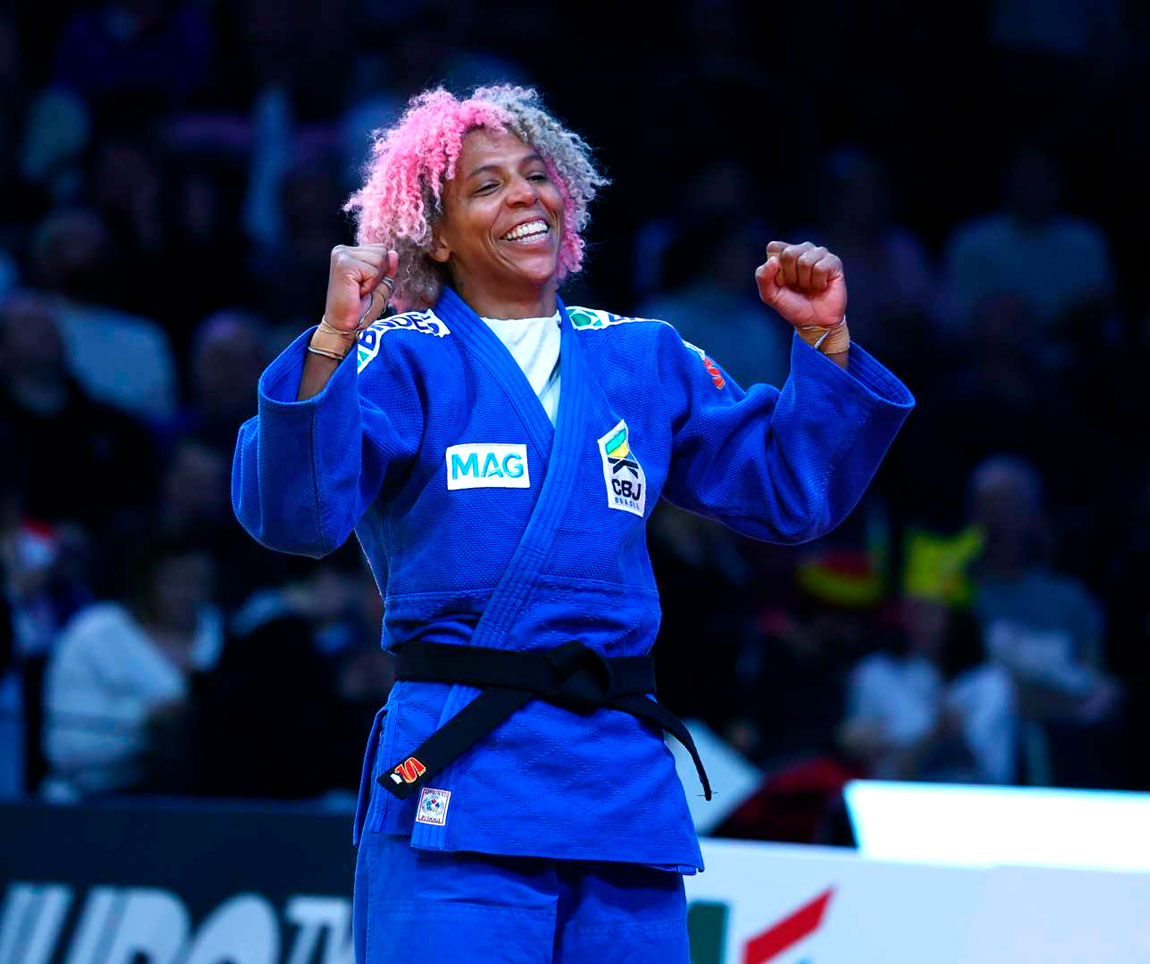
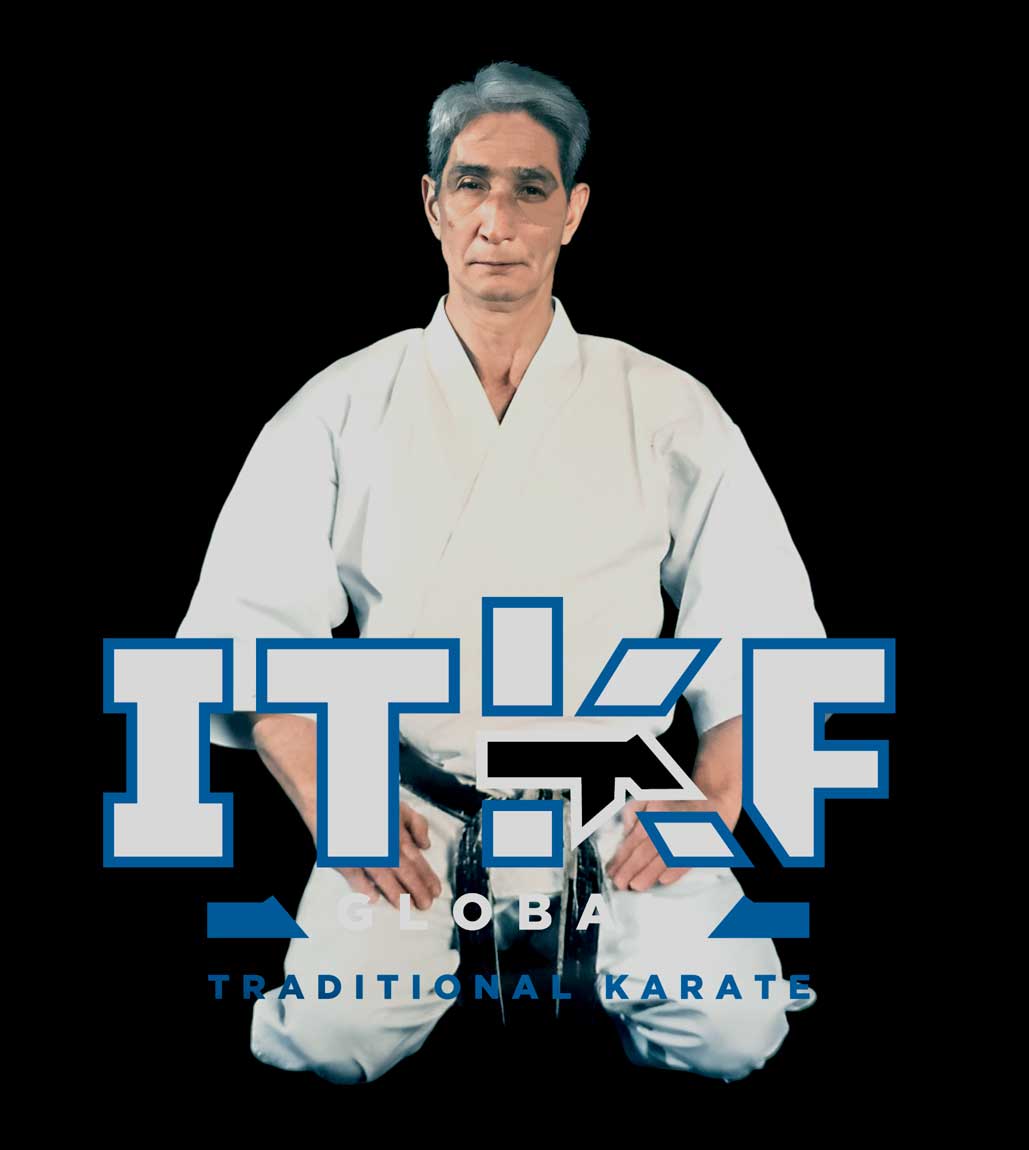 ITKF Global rigorously and legitimately fulfills the mission of perpetuating the technical and philosophical legacy of Shihan Hidetaka Nishiyama © Archive
ITKF Global rigorously and legitimately fulfills the mission of perpetuating the technical and philosophical legacy of Shihan Hidetaka Nishiyama © Archive
At a decisive moment for ITKF Global, three of the principal leaders of the International Traditional Karate Federation — Gilberto Gaertner (Chairman), Luiz Alberto Küster (Secretary-General), and Antonio Sérgio Palú Filho (Legal Director) — granted an exclusive interview to Budô Magazine.
With detailed, well-founded responses, the federation’s leaders outlined the legal and institutional milestones that ensure the legitimacy of ITKF, dismantled attempts to circumvent the legacy of Hidetaka Nishiyama, and presented the foundations that support the federation’s current structure. The result is a clarifying document of historical and legal value, reaffirming ITKF’s commitment to governance, ethics, and the essence of Karate as budō.
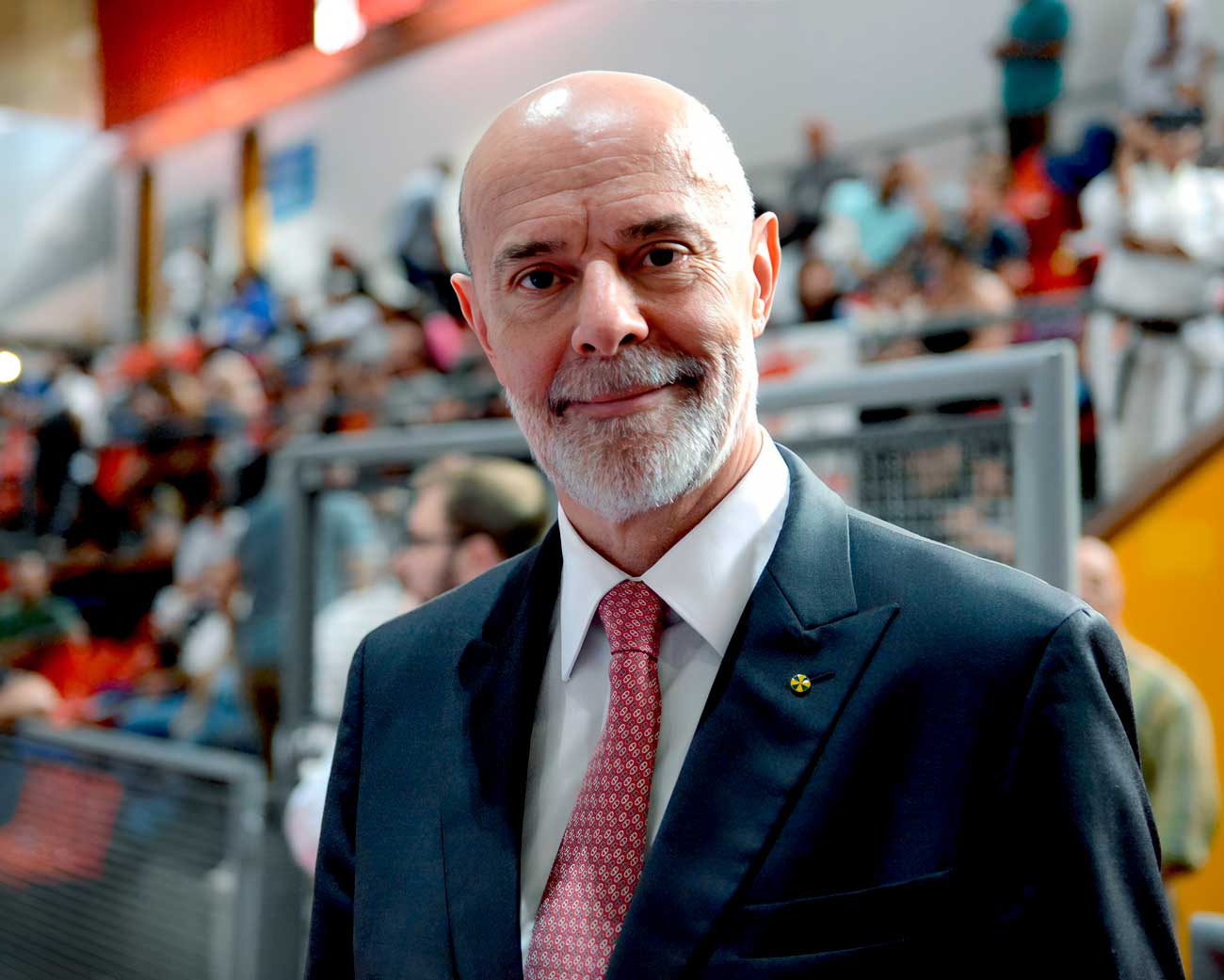
Professor Luiz Alberto Küster, ITKF Secretary-General, served as secretary for two historic General Assemblies of the federation: the 1990 Assembly in Lima, led by Hidetaka Nishiyama, and the 2019 Assembly in Curitiba — both milestones in the institutional consolidation of Traditional Karate © Global Sports
We began this interview by speaking with Luiz Alberto Küster, Secretary-General of the International Traditional Karate Federation, who discussed the origins of ITKF and the mission of Master Nishiyama and the federation on the international stage:
“Of course, it is always an honor to recall our origins. The International Traditional Karate Federation (ITKF) was born under the visionary leadership of Master Hidetaka Nishiyama, one of the founding members and one of the initial directors of the Japan Karate Association (JKA), officially established on May 27, 1955, under the mentorship of Master Gichin Funakoshi.
In 1961, while already residing in Los Angeles, California, USA, Master Nishiyama founded the All American Karate Federation (AAKF), which became much more than a national organization. In practice, it served as the international arm of the JKA and the institutional embryo of the future ITKF. It was an organization with a clear international vision, aimed at preserving Karate as a martial art and not merely as a sport. In 1974, the AAKF began to be called the International Amateur Karate Federation (IAKF).
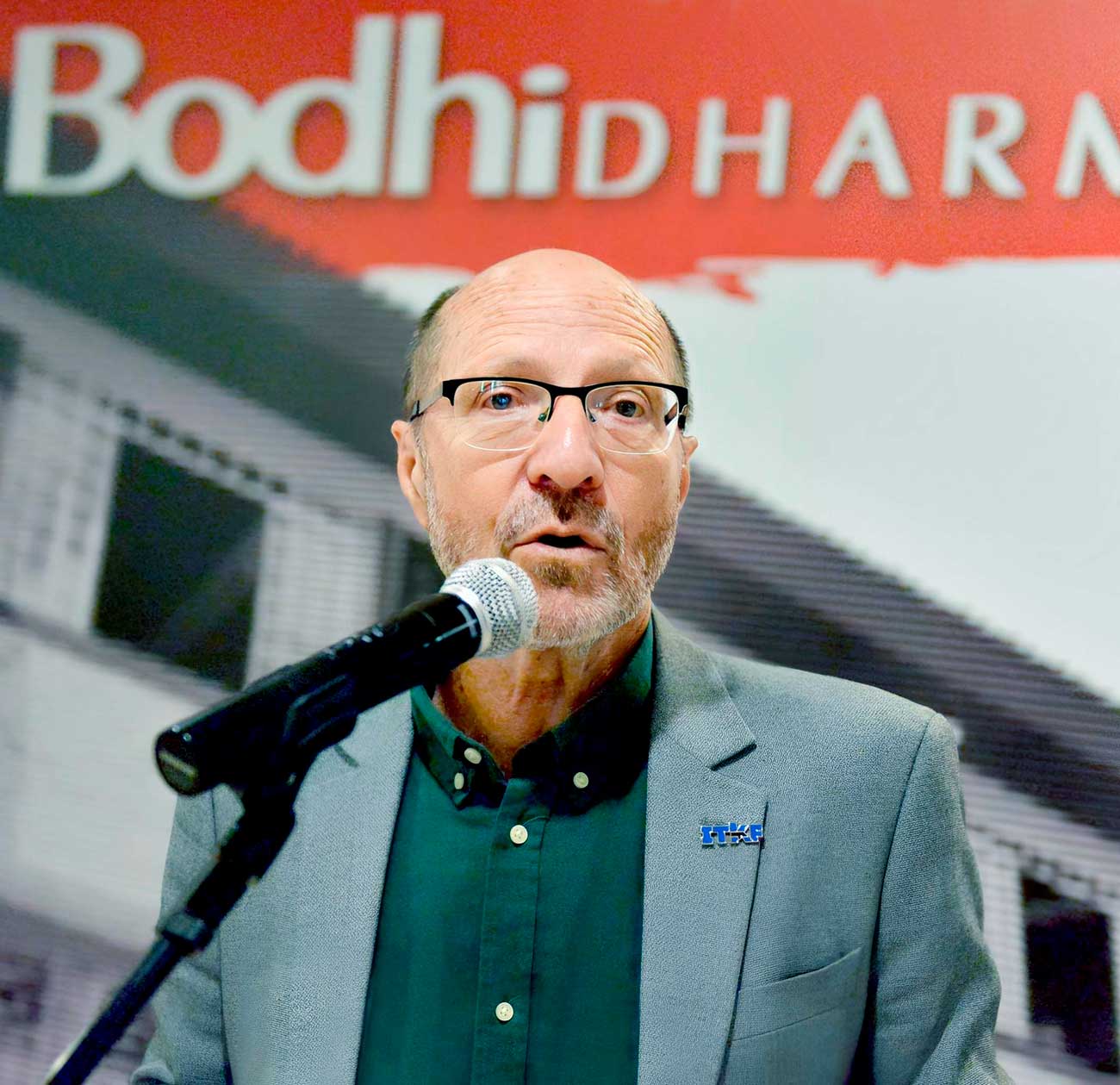
Gilberto Gaertner, ITKF Chairman, leads the federation’s reconstruction with structural reforms that project Traditional Karate into the 21st century — overcoming resistance and consolidating a new era of governance and legitimacy © Global Sports
An important milestone occurred in 1975 with the organization of the first World Karate Championship, held by the AAKF with direct support from the JKA, in Los Angeles. This championship was born precisely in response to the dissatisfaction of Japanese leaders with the rules of WUKO — the World Union of Karate-do Organizations — which had been tested since the 1970 World Tournament but which distorted the technical and philosophical essence of Karate as budō. The decision to create an alternative competition, based on the principles of Traditional Karate, was a significant turning point.
In 1985, the organization officially assumed the name International Traditional Karate Federation — ITKF — declaring to the world its’ identity as the guardian of Traditional Karate. In 1987, the IOC — International Olympic Committee — formally recognized ITKF as the international federation responsible for Traditional Karate, in contrast to the sport karate of WUKO.
Personally, I believe an institution is truly born when it approves its constitution. I had the privilege of being present at that historic moment: at the ITKF General Assembly, held during the 5th ITKF World Championship in Lima, Peru, in 1990, I sat at the head table alongside Master Nishiyama and representatives from all continents. The ITKF constitution was approved, establishing it as an autonomous, legitimate international entity, dedicated to the spirit of budō. It was a milestone that has remained etched in my memory ever since,” stated the Secretary-General.
Gilberto Gaertner, ITKF Chairman, spoke about the most critical and challenging moment for Traditional Karate after Master Nishiyama’s passing in October 2008, when the organization faced its greatest obstacles to ensuring continuity in accordance with the original principles and statutes.
“This was, without a doubt, one of the most sensitive moments in our history. The passing of Master Nishiyama in 2008 was not only the loss of a technical and philosophical leader but also the collapse of an institutional structure that was already weakened at that time. What became evident in the months and years that followed was that ITKF lacked a solid foundation and effective governance to carry forward his legacy.
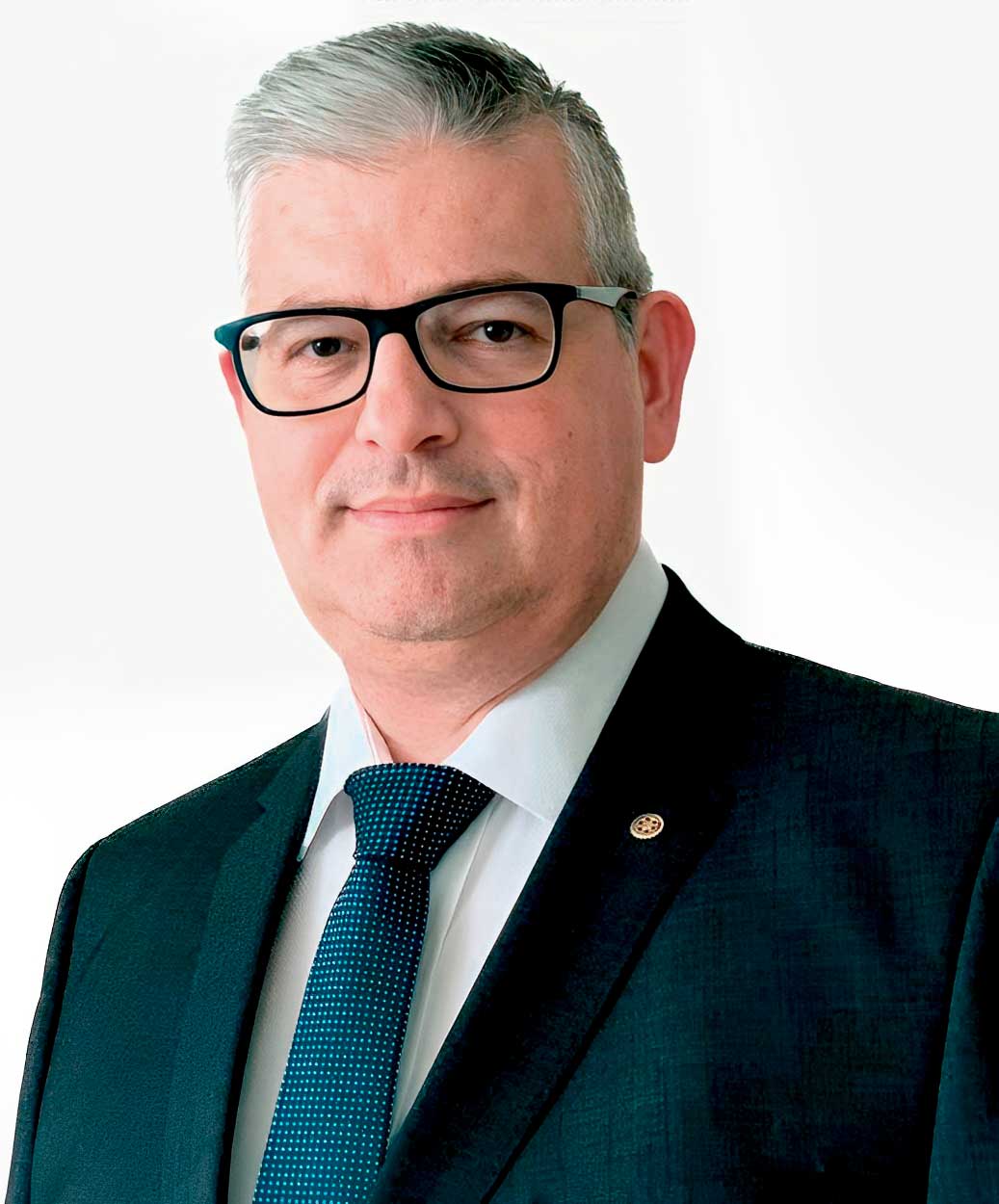
Antonio Sérgio Palú Filho, ITKF Legal Director, works with technical rigor in the legal consolidation of the federation, ensuring legal security and institutional integrity in an organization present on five continentes © Global Sports
This reality became even clearer through a letter written by Ms. Nami Nishiyama, daughter of Master Hidetaka Nishiyama who was the manager of the ITKF office in Los Angeles. Addressed to Włodzimierz Kwieciński, president of the Polish federation, the letter revealed that, since 2002, ITKF had already been suspended as a legal entity in the United States due to failure to meet basic documentational requirements with U.S. tax authorities.
According to Nami Nishiyama, the situation worsened significantly when Ms. Aiko Tori, Master Nishiyama’s right-hand and the person responsible for finances and documentation, was diagnosed with Alzheimer’s disease. Aiko was in charge of managing no fewer than four organizations: AAKF, ITKF, JKA-USA, and the National Karate Institute. With her gradual decline, the entire structure collapsed. By 2005, given the seriousness of the situation, Master Nishiyama invited his daughter Nami to take over the administrative routine of the office and seek to stabilize the situation with the support of accountants and lawyers. This change demonstrated that, until the end of his life, the Master worked tirelessly to preserve the organization.
The central problem was that, although the ITKF name still existed, in practice the organization was no longer allowed to legally operate in the United States. From 2008 onward, the great challenge became how to rebuild ITKF institutionally. It was no longer enough to invoke Master Nishiyama’s name; it was necessary to restructure the federation legally, establish legitimate governance, record meeting minutes, formalize headquarters, and publish official documents.
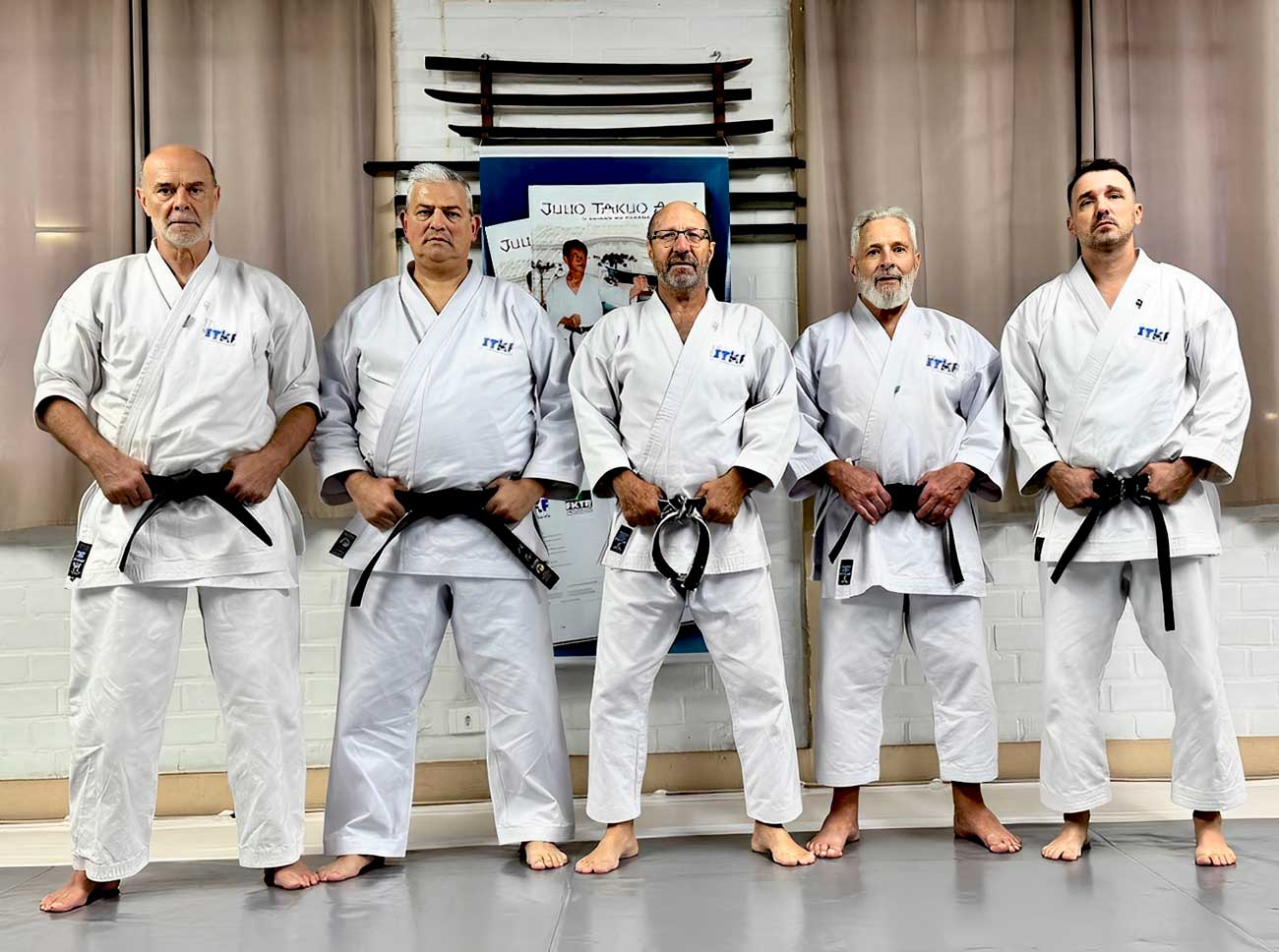
Main ITKF leadership: Luiz Alberto Küster (Secretary-General), Antonio Sérgio Palú Filho (Legal Director), Gilberto Gaertner (Chairman), Rui Francisco Martins Marçal (Treasurer), and Sadiomar Santos (Director-General), responsible for conducting the federation’s global governance with legitimacy, transparency, and commitment to the legacy of Traditional Karate © ITKF Global
In 2010, during my term as president of the Brazilian Traditional Karate Confederation (CBKT), we made a herculean effort in partnership with the Pontifical Catholic University of Paraná (PUCPR), with the invaluable collaboration of then Vice-Rector Roberto Burnet, to host the 10th Traditional Karate World Championship in Curitiba. The main objective was to preserve institutional unity in the first championship after our great master’s passing. The event was successful, both in terms of organization and participation. One of the highlights was the ability to bring together all the world leaders, senior instructors, and the main technical references of the time.
Unfortunately, this unity was short-lived. In 2013, the first internal conflict within the organization arose, culminating in a split that resulted in the creation of another Traditional Karate entity, an episode that further weakened ITKF. From that division onward, the institution gradually lost strength.
Effective restructuring and institutional revitalization only became possible years later, thanks to the dedication of leaders truly committed to the authentic spirit of Traditional Karate and to the responsibility of preserving, with legality and integrity, of our master’s legacy,” explained Gaertner.
The 2019 General Assembly is considered a turning point for the organization. Professor Küster detailed the decisions made regarding the relocation of the administrative headquarters to Brazil, as well as the international leaders present, such as Senseis Jorgensen and the Nedev family, among others.
“The 2019 General Assembly, held during the World Championship in Curitiba, was indeed a watershed moment. To fully understand it, we must go back two years, to the 2017 Assembly in Montecatini, Italy. Richard Jorgensen, who had assumed leadership of ITKF, found himself weakened amid a series of internal disputes, institutional wear, and a string of failed attempts to promote championships alongside other organizations.
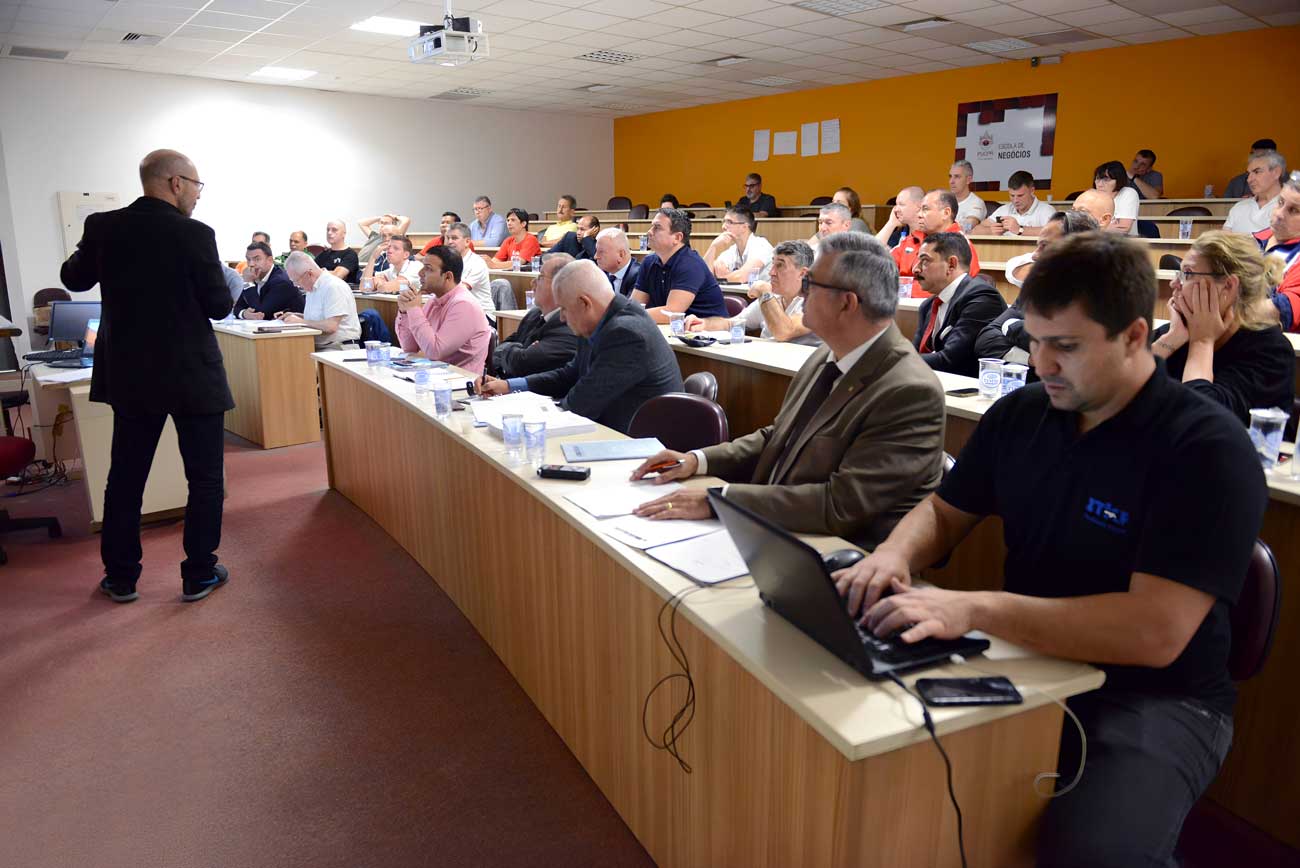
ITKF General Assembly held on December 5, 2019, at the campus of the Catholic University of Curitiba, Brazil © Global Sports
During the 2017 Assembly, in addition to the election of Professor Gilberto as ITKF Chairman, it was decided that the 2019 World Championship would be held in Macedonia, an offer made by the local federation led by the Nedev family. However, seven months before the event, Dejan Nedev announced his inability to host it. This was considered a deliberate move to provoke the collapse of the newly elected Chairman’s administration. What he did not expect was the strong reaction from ITKF’s new leadership and Brazilian karate, with Gaertner promptly taking responsibility for organizing the 2019 World Championship and transferring it to Curitiba.
During the championship, Professor Gilberto brought together leaders from several countries and fostered a creative, institutional, and forward-looking environment. It was there that Vinicius Santana — our “Vina” — emerged; a Traditional Karate athlete with world titles and high-level executive experience. At Professor Gilberto’s request, Vina led a strategic planning process entitled: “What is the Future We Want for ITKF?”
This process culminated in the General Assembly, held during the same period, with the presence of global representatives from more than twenty countries, including Richard Jorgensen, representing the Canadian Federation, and the Nedev family, representing the Macedonian Federation. ITKF’s continuity was confirmed based on a new, realistic, democratic, and responsible institutional model. By unanimous decision, it was resolved to transfer ITKF’s administrative headquarters from Los Angeles to Curitiba. From that decision, formal procedures were authorized: opening a bank account, hiring an accountant, legally establishing the entity, and solidifying a physical operational base.
For several years prior to this, there was no actual headquarters or legal standing for the organization. The decision of the 2019 Assembly was as solid as it was unexpected for some. So much so that, in the following years, Mr. Jorgensen and Mr. Nedev took very different paths. Jorgensen, clinging to the emotional appeal of the city of Los Angeles, reopened a spurious entity called “ITKF California,” but without any legal or associative legitimacy. He elevated himself to the Chairman of the organization which had no members.
Dejan Nedev, in an even bolder move, copied the legal-institutional model implemented in Curitiba and began operating under the name “ITKF Macedonia,” using statutory documents and regulations clearly derived from the original ITKF framework.
The most important point is that, regardless of the opposing actions of Mr. Jorgensen and Mr. Nedev, it was in 2019 that ITKF stopped surviving by inertia and was reborn as a living, legal, active organization committed to the spirit of Traditional Karate.”
Antonio Sérgio Palú Filho, ITKF’s Legal Director explained the importance of maintain all documentation, including meeting minutes and videos of the 2019 Assembly when the members voted to move the headquarters to Brazil. This information has always been available to ITKF members.
Mr. Filho also stated “This is an absolutely central issue to understand ITKF’s new chapter. When we decided to transfer the federation’s administrative headquarters to Brazil during the 2019 General Assembly, we knew that a symbolic gesture would not be enough. It was necessary to rebuild ITKF’s legal foundation on solid, transparent pillars — and that is exactly what we did.
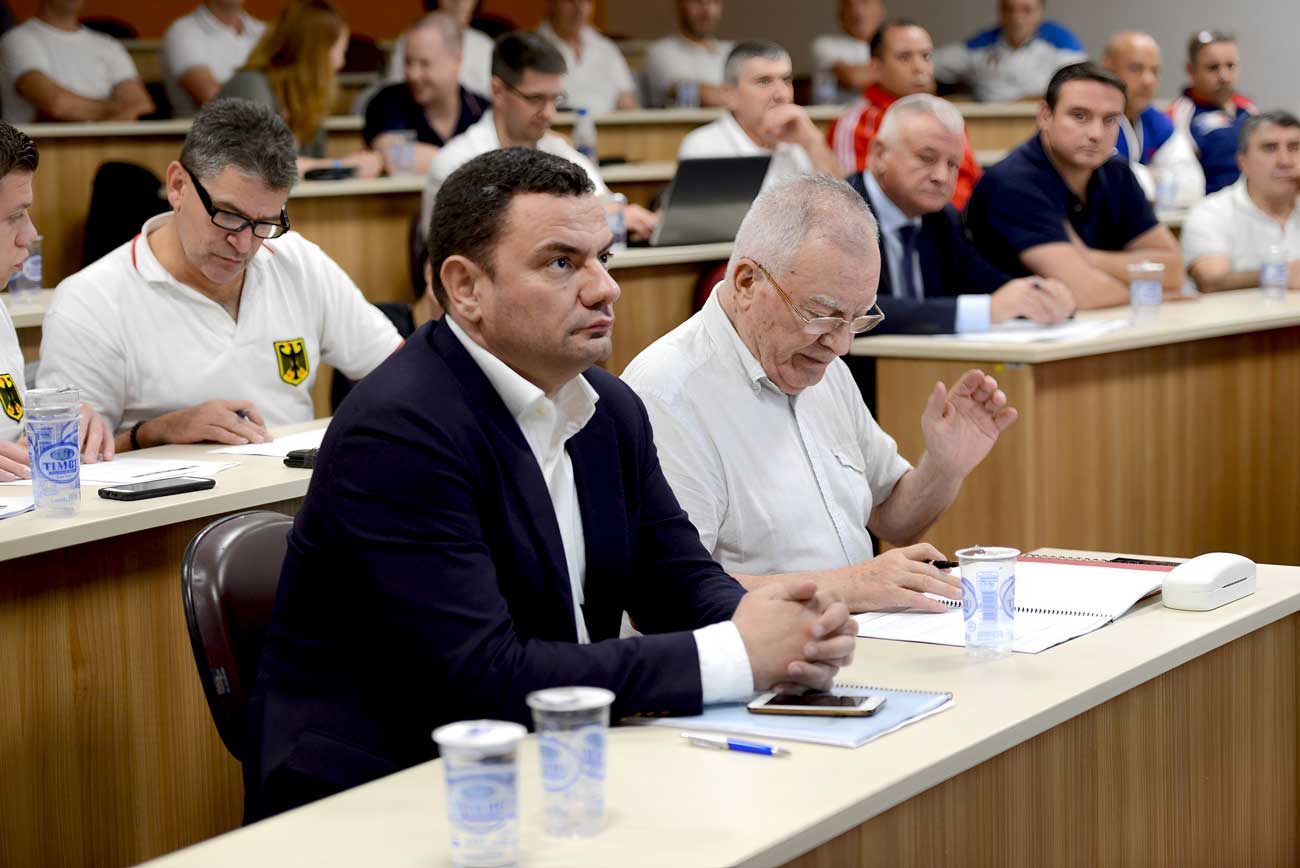
Dejan Nedev, President of the Macedonian Federation, at the ITKF General Assembly held on December 5, 2019, at the campus of the Catholic University of Curitiba, Brazil © Global Sports
The 2019 Assembly was endorsed by the significant presence of our international members, recorded in the minutes, accompanied by official documentation and photographic evidence, including the presence of Mr. Richard Jorgensen and the Nedev family. These records dismantle any later narrative of ignorance or disagreement with those decisions — Those decisions were approved unanimously, through official votes.
Since then, ITKF has operated as a formally constituted entity in Brazil, registered at the 1st Registry of Deeds and Documents of Curitiba. We opened a bank account at Santander, which has been active for more than six years. The practice of “cash” operations, which, unfortunately, had been the norm for a long time was discontinued and only occurs when absolutely necessary, and with proper accountability.
In addition, all records of ITKF assemblies held since 2017 — including minutes, communications, reports, and statutory updates — are available on our modern, user-friendly digital portal. This public documentary base not only ensures institutional transparency but also strengthens the organization’s legitimacy to its’ members, international partners, and regulatory authorities.
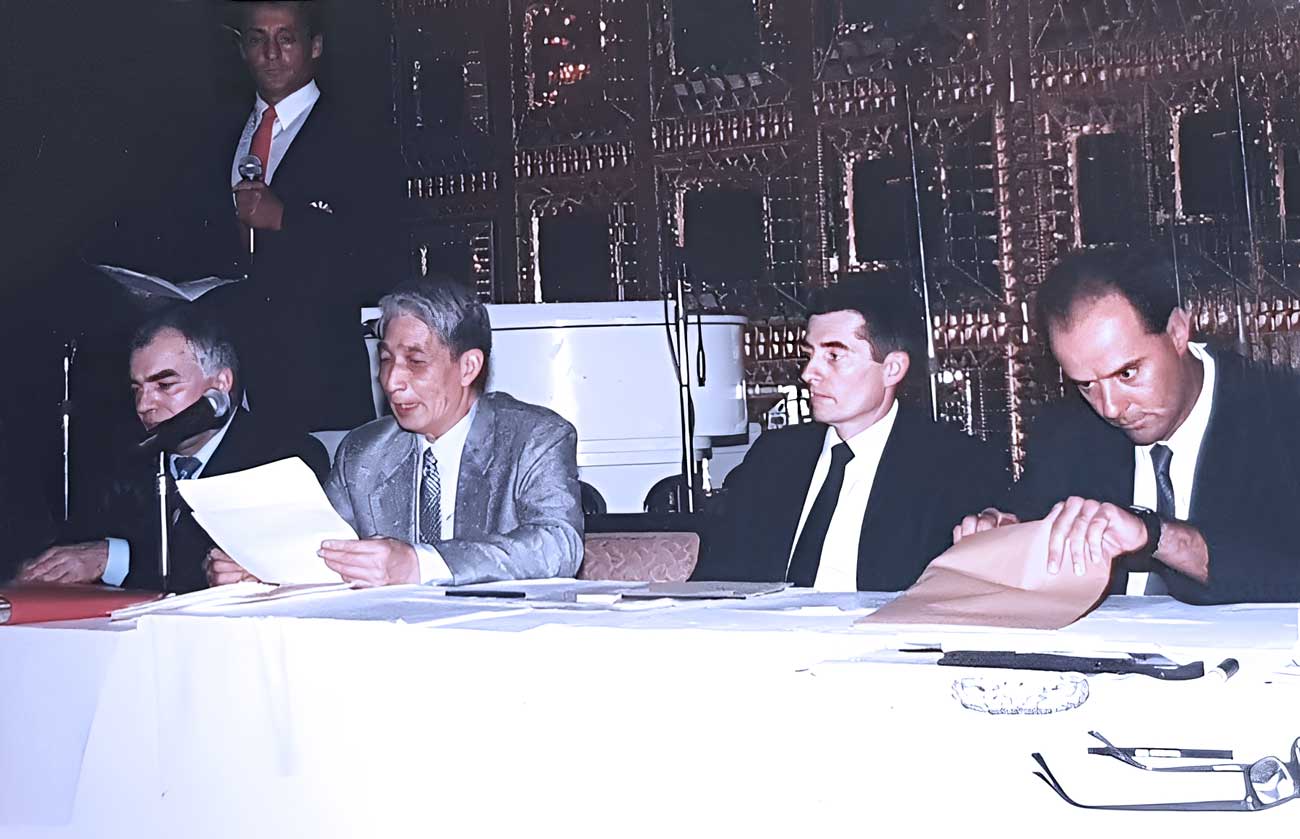
ITKF General Assembly in Lima, Peru, 1990 – Approval of the ITKF Constitution © ITKF Global
In a global scenario where parallel initiatives attempt to replicate or distort ITKF’s identity, the strength of our legal documentation is the shield that protects our institutional integrity. We are a living entity, legally constituted, with solid governance, a registered trademark and protected by the INPI (Brazilian National Institute of Industrial Property), as well as recognized international agreements. We rigorously fulfill all legal, fiscal, and tax obligations before the Brazilian government, the country where our organization is currently headquartered. There is no room for improvisation or opportunism: our legitimacy is built with responsibility, transparency, and respect for the rules.”
Dr. Palú reiterated that, even after ITKF’s legal reconstruction in Brazil, the federation kept open its channels of dialogue with former international leaders, such as Mr. Richard Jorgensen and Mr. Dejan Nedev. He clearly expressed his assessment of both men’s stance, particularly in light of the opportunities they were given to participate in official interviews, their refusal to recognize the constitution approved in 2021, and their absence from the General Assembly held in Portugal that same year, at which the definitive transfer of the global headquarters to the country of residence of the elected Chairman was decided.
“Beyond being a delicate matter, this issue is very important because it demonstrates how ITKF acted correctly, with a democratic spirit and total transparency. Contrary to what many imagined, both Mr. Richard Jorgensen and Mr. Dejan Nedev, were at the time legitimate representatives of member federations. They also accepted our formal invitations and gave interviews for ITKF’s official channels. These interviews are published and available on our institutional portal. We made a point of guaranteeing space for all those who, in some way, were part of our history.
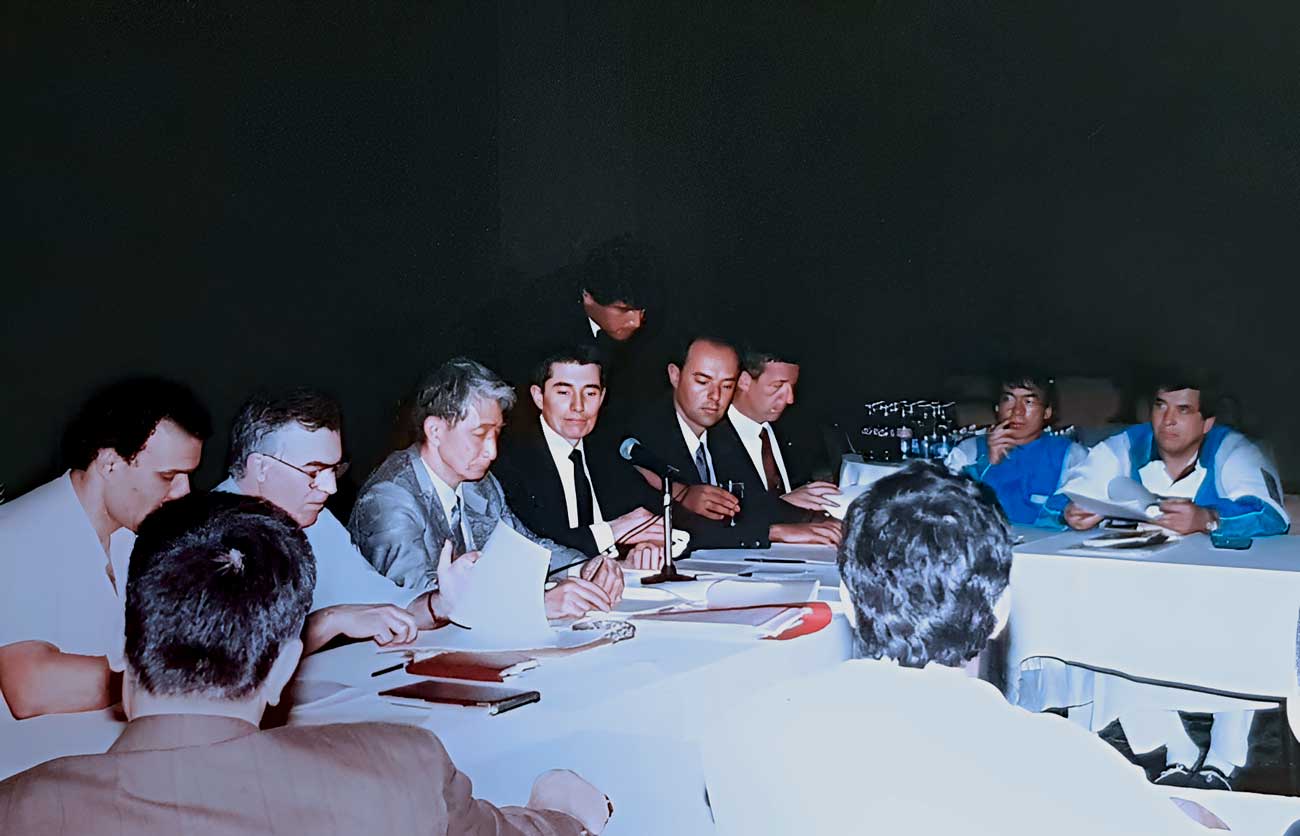
Among the leaders present at the Lima meeting were Wayo Salas (Peru); Dr. Jorga (Yugoslavia); Sensei Hidetaka Nishiyama, ITKF President; Michael Crowe, ITKF Secretary-General; Luiz Alberto Küster (Brazil); and Luigi Puricelli (Italy) © ITKF Global
In 2021, when ITKF’s General Assembly requested that all members formally reaffirm, in writing, their commitment to the federation’s constitution — a symbolic but fundamental gesture after years of fragmentation. Both Mr. Jorgensen and Mr. Nedev, while representing their respective member federations, refused to sign this commitment, clearly signaling their withdrawal from the institutional line. Additionally, they refused to approve the admission of new member federations.
To further demonstrate the continued attempts for diplomacy during the entire process, neither members nor their member federations were expelled or disaffiliated until 2022.
The turning point came when the organization became aware of their actions to create parallel institutions, using the same structure that Professor Gilberto inherited in 2017. These actions became the legal basis for the expulsion of the Canadian and Macedonian federations, in accordance with the provisions of the Constitution that both had refused to ratify.
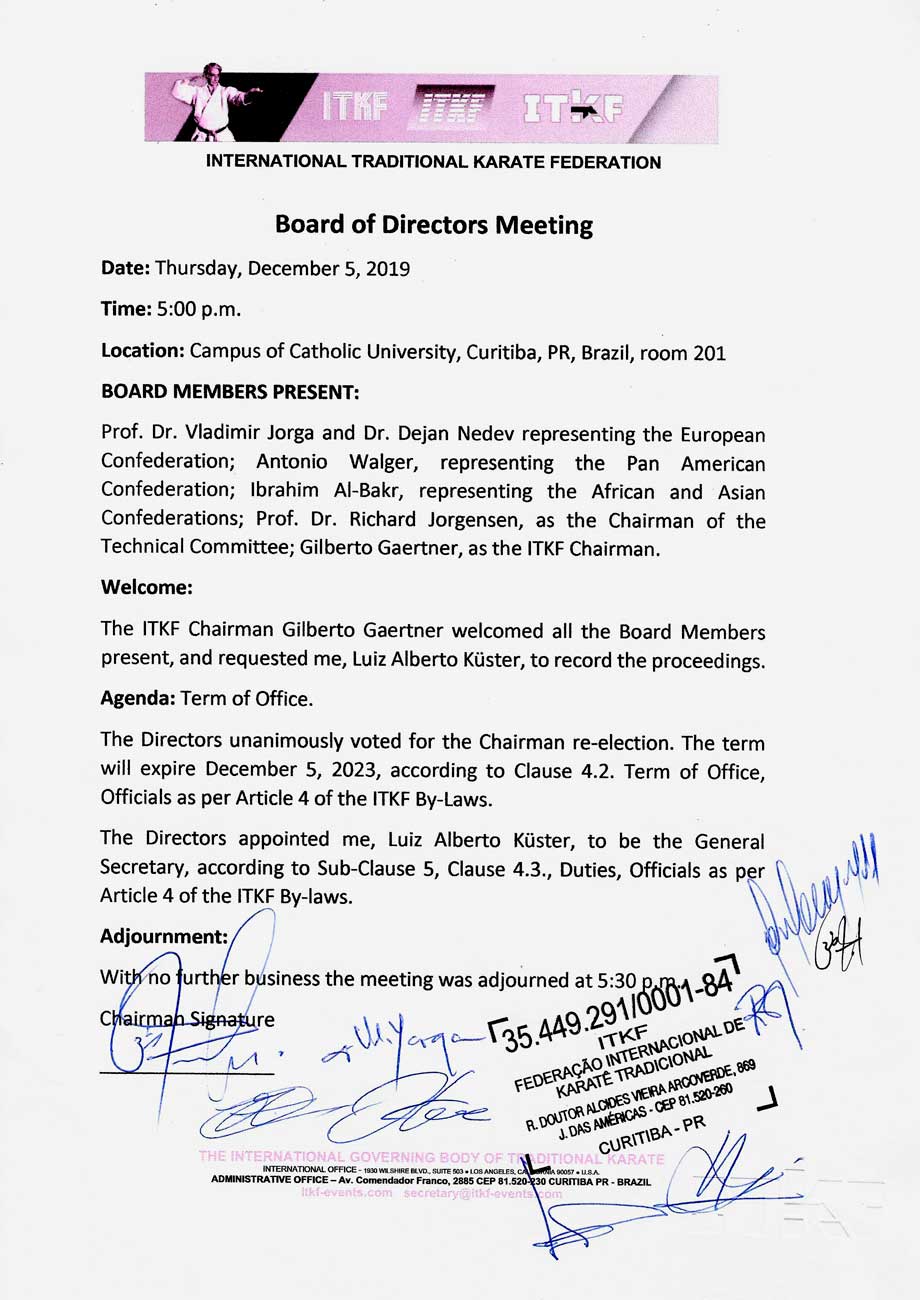
Meeting of the ITKF Global Board of Directors held in 2019, with the presence of Richard Jorgensen and Dejan Nedev as members of the international board © ITKF Global
At the General Assembly meeting, held during the European Championship in Portugal, the proposal to permanently transfer ITKF’s administrative headquarters to the country of residence of the democratically elected Chairman was approved unanimously. This decision reinforces the organization’s commitment to representativeness, democratic governance, and strategic adaptation to the global dynamics of sports.
As a result, the headquarters began operating legally in Brazil, where the current Chairman, Professor Gilberto Gaertner, resides, and will remain there until the next elections.
This measure has proven to be extremely effective. It has clearly resolved the issue of a ‘symbolic headquarters,’ which for many years was nothing more than a vague idea in Los Angeles, with no physical office, no accounting, and no legal standing. Now, ITKF has an address, a tax registration number (CNPJ), full financial accountability, an active bank operation, and is legally constituted.
Most importantly, this is a solution that respects the federation’s democratic spirit. In 2026, we will have new elections for a new Chairman, and the headquarters will automatically be transferred to the country of the newly elected leader, whomever that may be. This ensures agility, legality, and efficiency. We will continue on this path, with firmness, legitimacy, and the certainty that Master Nishiyama’s legacy is being honored with integrity and a forward-looking vision.”
The innovative changes approved at the 2019 General Assembly, held in Curitiba, reinforced ITKF’s legitimacy and sovereignty. The process was endorsed by continental leaders, members of the Technical Committee, and representatives from 17 national federations, demonstrating broad international representation. Among the main signatories were ITKF Chairman Gilberto Gaertner; Pan-American Confederation President Antonio Walger; then European Confederation President Vladimir Jorga; European Federation Secretary-General Dejan Nedev; African Confederation President Ibrahim Al Bakr; ITKF Secretary-General Luiz Alberto Küster; and Technical Committee member Richard Jorgensen.
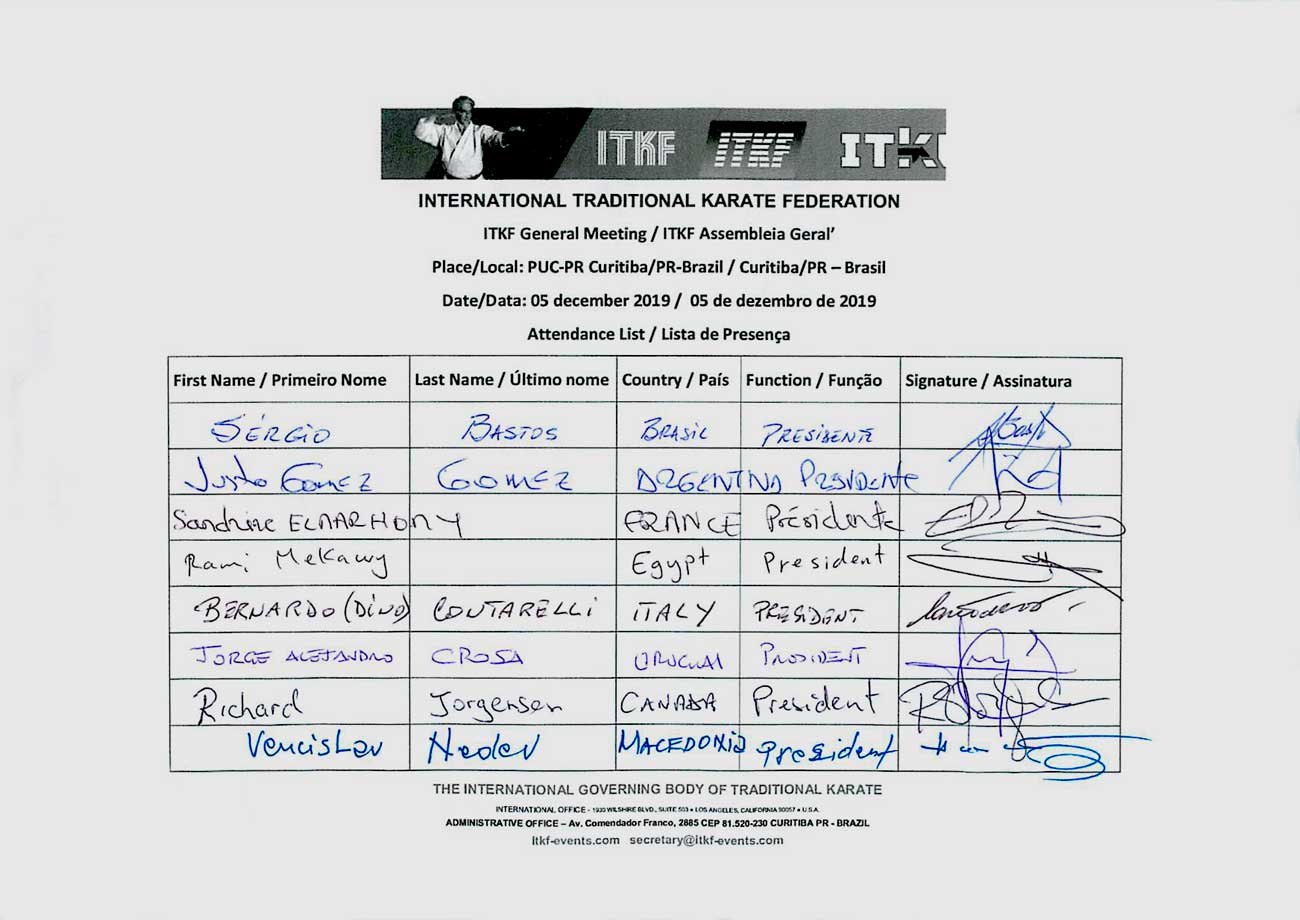
Attendance list of the 2019 ITKF Global General Assembly, signed by Richard Jorgensen and Dejan Nedev as officially present members © ITKF Global
The reforms were also ratified by the presidents of the national federations of Canada (Richard Jorgensen), Macedonia (Vencislav Nedev), Brazil (Sérgio Bastos), Argentina (Justo Gómez), France (Sandrine El Marhomy), Egypt (Ramy Mekawy), Italy (Dino Contarelli), Uruguay (Jorge Crosa), Germany (Helmut Eisenmann), Slovenia (Roman Pavlovic), Bosnia and Herzegovina (Redzep Gradjan), Israel (Eyal Nir), Indonesia (Muchlas Rowi), Portugal (Fernando Silva), Uzbekistan (Shukhratjon Kushmuradov), Serbia (Vladimir Jorga), and Romania (Nicolae Marandici and Cornell Musat).
The geographic diversity of the signatories reinforces the legality and representativeness of the statutory reform, which consolidated the new phase of ITKF’s global governance.
Another important factor to highlight is the prominence of national and regional leaders who have elevated Traditional Karate in their respective regions of origin. Names such as the President of the African Confederation, Ibrahim Al Bakr; the President of Slovenia, Roman Pavlovic; from Portugal, Fernando Silva; from Egypt, Ramy El Mekawi; from Argentina, Justo Gómez; from France, Sandrine El Marhomy; from Italy, Dino Contarelli; and from Romania, Nicolae Marandici and Cornell Musat, among others.
Under the leadership of Professor Gilberto Gaertner, ITKF has experienced a cycle of institutional reconstruction, reaffirmation of the foundational values of Traditional Karate, and expansion of its international projection. In light of emerging parallel initiatives attempting to improperly claim Master Nishiyama’s legacy, the ITKF Chairman addressed in detail, the foundations that ensure the federation’s legitimacy and historical continuity. He also spoke about recent advances in digital governance, administrative innovation, and ITKF’s plans for developing new leaders, with a focus on the electoral process scheduled for 2026.
“Unfortunately, the world of karate also faces serious distortions, driven by egocentric minds in need of validation, and we must address them clearly. There are organizations created by former members of our institution who, after having their ties severed in accordance with our constitution, began copying our structure, our regulations, our visual identity, and even our name, attempting to present themselves as the legitimate continuation of the federation founded by Hidetaka Nishiyama. This is absolutely unacceptable.
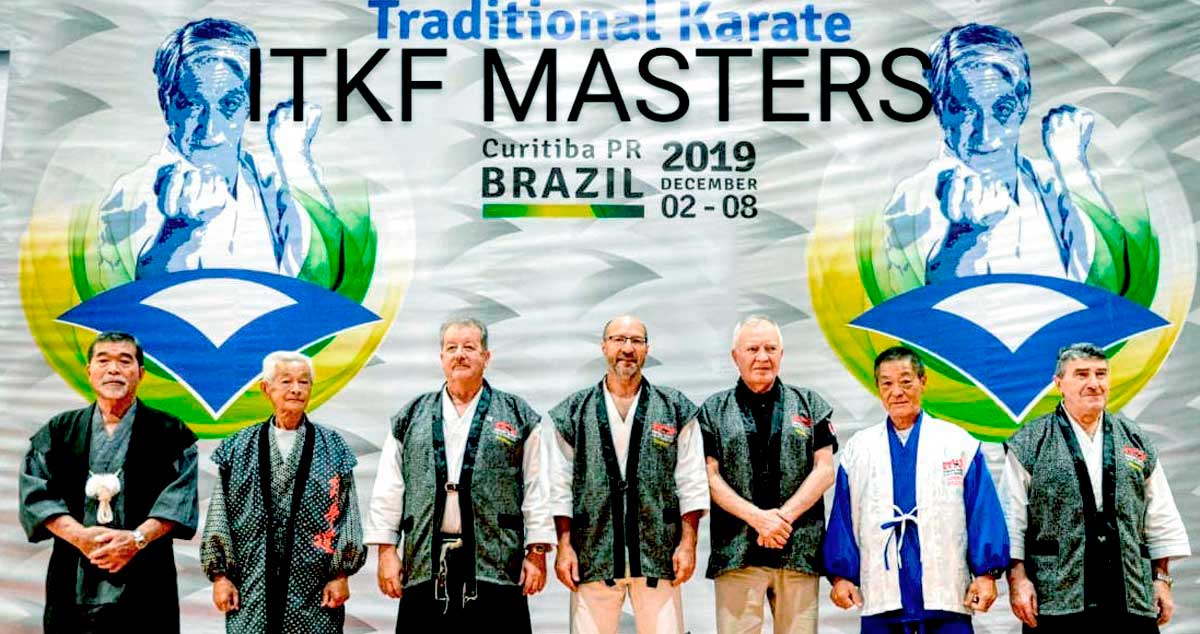
2019 Master Course featuring the main technical leaders of ITKF Global that year: Professors Machida, Arai, Jorgensen, Gilberto, Jorga, Watanabe, and Contarelli © ITKF Global
We are facing practices that amount to institutional fraud and may involve crimes such as misappropriation of intellectual property, unfair competition, and falsification of corporate identity. These are entities with no real headquarters, no legal structure, no democratically elected board, no registered members — operating based on appearances, driven by social media, and, in many cases, with deliberate bad faith,” denounced Gaertner.
Regarding the attempt to usurp ITKF’s legacy by individuals who once were part of the organization, Secretary-General Luiz Alberto Küster made a blunt remark that summarizes the seriousness of the situation:
“It would be almost laughable — if it weren’t so dishonest — that Mr. Nedev and Mr. Jorgensen, who were once active ITKF members with complete access, voting rights, and visibility, now try to distort reality and label as ‘legitimate’ precisely the fraudulent and spurious entities they themselves created. This includes social media fabrications with no institutional backing, which, in principle, constitutes serious violations of intellectual property and organizational loyalty.”
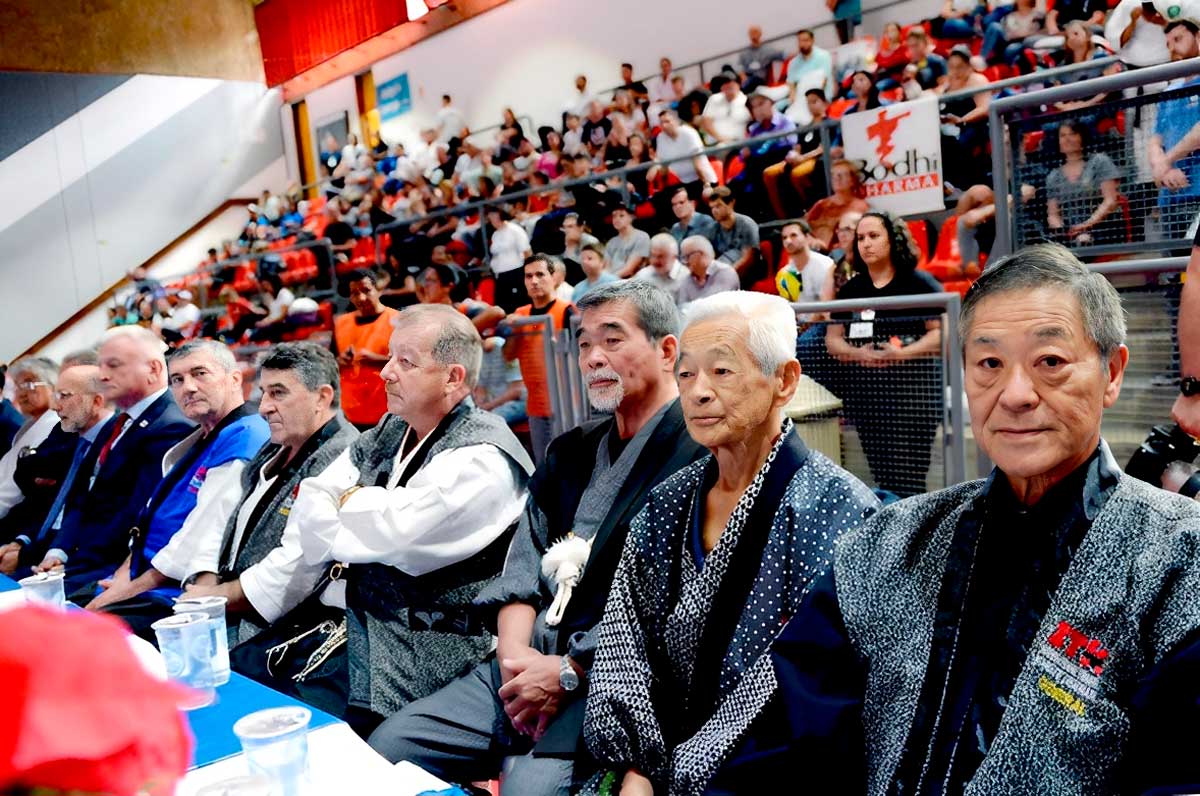
Head table at the opening ceremony of the 2019 World Championship held in Curitiba © ITKF Global
In response to attempts towards identity theft and attacks on ITKF’s institutional integrity, Chairman Gilberto Gaertner reinforces the federation’s strategic response and explains how governance has been consolidated based on statutory principles, documentary legitimacy, and fidelity to Master Nishiyama’s legacy.
Faced with this scenario, ITKF responded with organization, firmness, and integrity. We consolidated our governance based on well-defined statutory procedures, broadly participatory assemblies, and formal records that are publicly available on our institutional portal. These records unequivocally demonstrate the legitimate continuity of ITKF Global, now legally structured and ethically managed, faithful to Master Nishiyama’s legacy and committed to the future of Traditional Karate.
It is equally important to state that we are not opposed to the existence of sister organizations in the Traditional Karate world, much less to the independent activities of Master Nishiyama’s former students. On the contrary, we respect entities that act with integrity and their own identity. We wish them success and, perhaps in the future, we may build paths of cooperation, collaborative events, and bridges of technical and philosophical convergence.

Referees and officials at the 15th World Championship held in Curitiba in 2019 © ITKF Global
ITKF, for its part, is living a vigorous moment. We are affiliated with respected international institutions such as TAFISA, IAKS, and ICSSPE, and operate in full legal, fiscal, and institutional compliance in Brazil. In 2024, we also inaugurated a branch office in the European Union, with the aim of consolidating ITKF’s institutional presence on the European continent. We have a modern portal, integrated digital services, a public database of thousands of registered practitioners (https://itkf.global/dan-registrations/), official certifications, accessible reports, and an auditable, functional administrative system.
“Unfortunately, the world of karate also faces serious distortions, driven by egocentric minds in need of validation, and we must address them clearly.”
It is true that we are not part of the Olympic movement — not for lack of legitimacy, but for reasons beyond our control. The WKF, although formally recognized by the IOC (International Olympic Committee ) does not represent the technical, cultural, and institutional plurality of world karate. Even so, it receives disproportionate privileges, political support, and resources that have never been shared with other serious and representative organizations of the discipline.
This institutional distortion must be exposed. That is why ITKF is preparing a technical and legal article presenting facts, documents, and studies about the structural favoritism of the IOC toward WKF, to the detriment of an entire universe of practitioners and federations that remain faithful to Karate as a martial art, culture, and education.
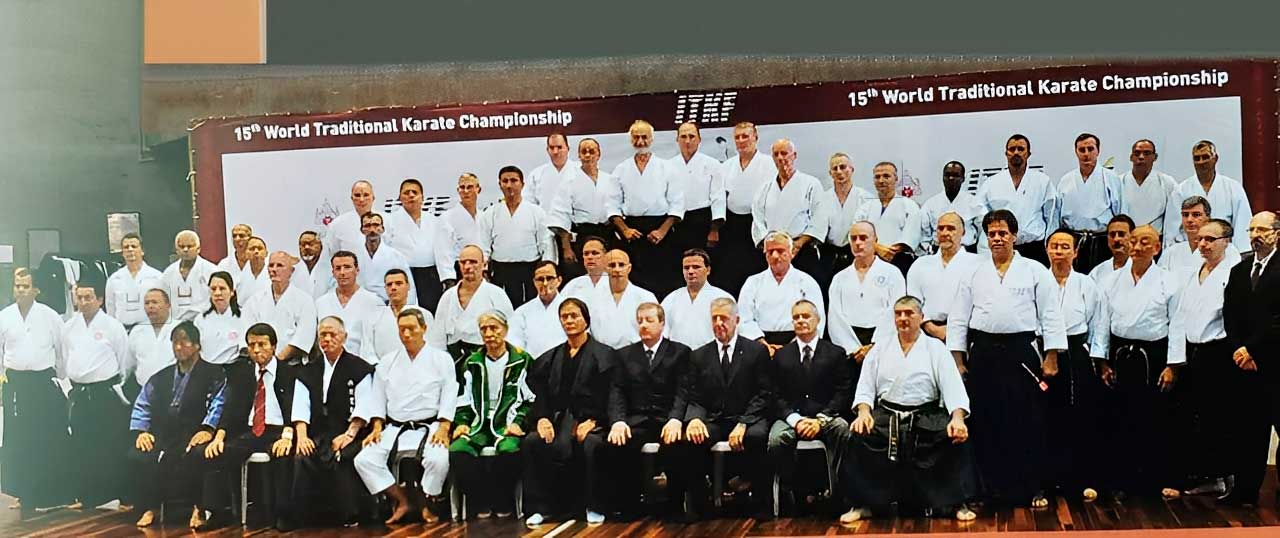
10th World Championship held in Curitiba in 2010 © ITKF Global
The IOC’s current logic is markedly elitist and commercial. Its criteria favor television sports, highly professionalized, while ignoring the strength and social impact of non-Olympic sport, which involves millions of practitioners around the world. Unfortunately, many governments remain “hypnotized” by this model and turn a blind eye to institutions like ITKF, which work seriously, promote health and values among children, youth, and adults, without governmental support, yet with deep social relevance.
In this context, ITKF stands firm. At our last board meeting, we approved the creation of the International Legal Committee, with the mission of providing technical and legal support to member federations, assisting in their legal formalization in their respective countries, trademark registration, intellectual property protection, and combating institutional fraud. This is a decisive step toward strengthening governance and the sovereignty of our member organizations.
Finally, I reaffirm our commitment to democratic governance. In 2026, we will hold new elections for the position of Chairman, in a public and auditable manner. And, as approved at the 2021 General Assembly in Portugal, ITKF’s administrative headquarters will automatically be transferred to the country of the elected Chairman. This is a simple, efficient solution that ensures continuous legitimacy, regardless of nationality or location.
“The International Traditional Karate Federation remains alive, whole, and determined, with its feet firmly planted in tradition and its actions and vision directed toward the future,” concluded the ITKF Chairman.

08 de fevereiro de 2026
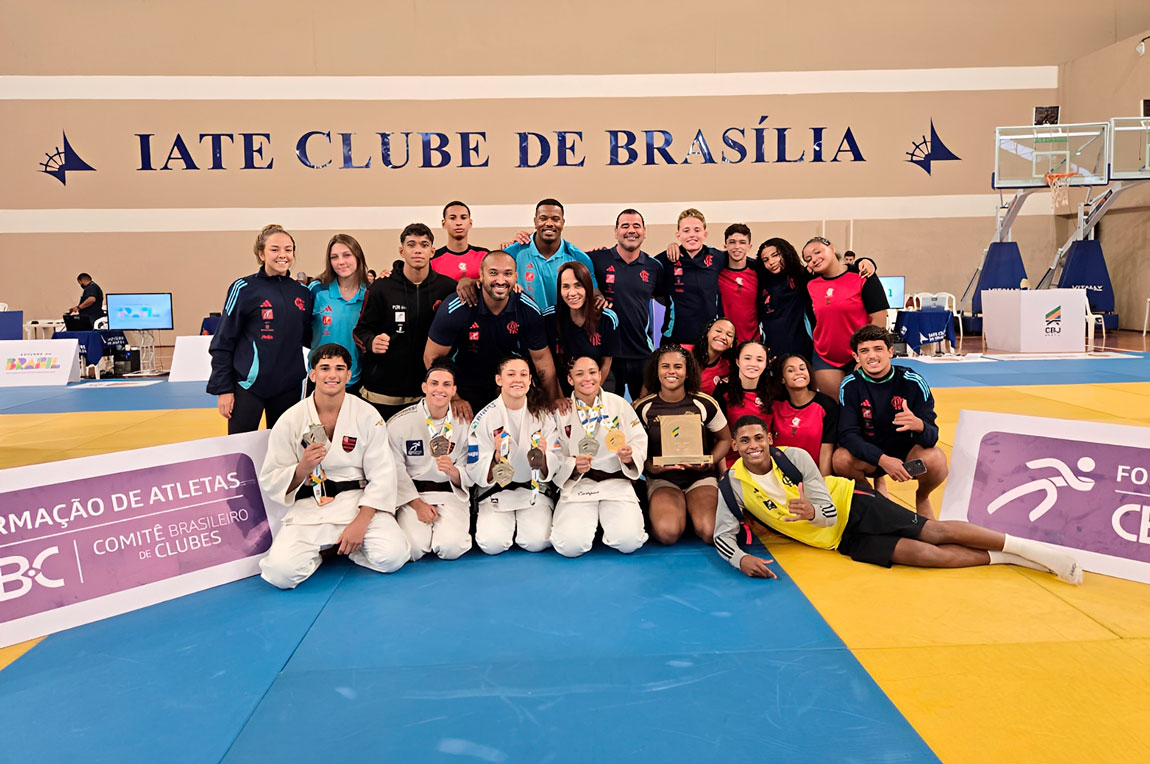
07 de fevereiro de 2026
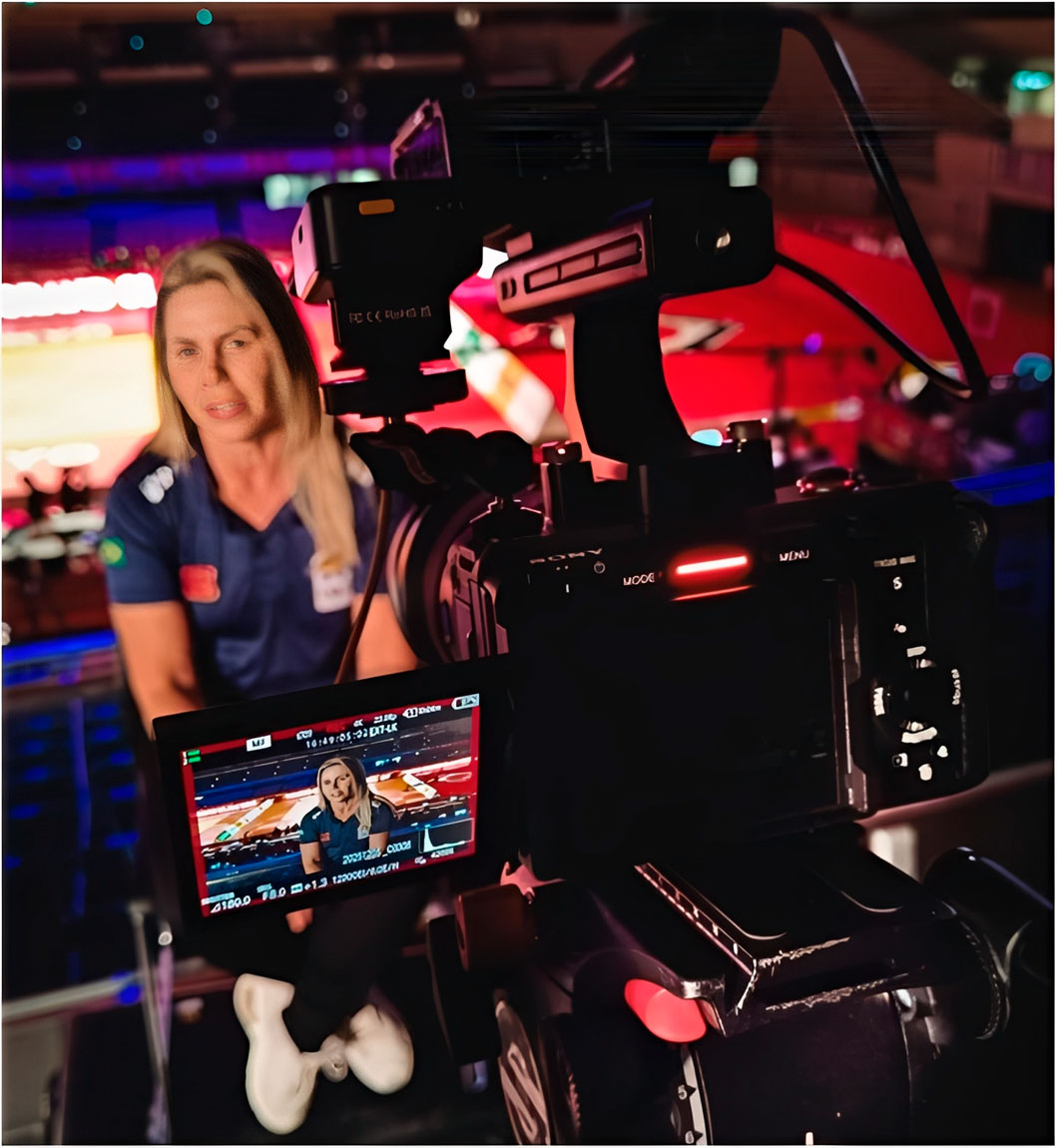
06 de fevereiro de 2026